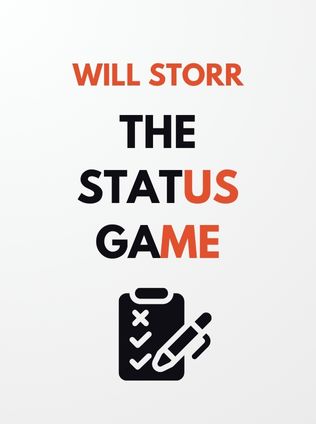
The Status Game
On Human Life and How to Play It
By Will Storr
Published 09/2021
About the Author
Will Storr is a celebrated British journalist and author whose work often explores the intricate workings of the human mind and society. His previous books, such as The Science of Storytelling and Selfie, delve into the psychological and social forces that shape our narratives and self-perceptions. In The Status Game, Storr examines the pervasive role of status in our lives, arguing that our drive for social standing is a fundamental aspect of human nature, deeply rooted in our evolutionary past. Storr’s writing is characterized by a keen understanding of complex psychological concepts, which he translates into engaging, thought-provoking narratives that resonate with a broad audience.
Main Idea
The Status Game by Will Storr posits that the quest for social status is a primary motivator in human behavior. This drive, Storr argues, is not merely about vanity or social approval; it is a fundamental survival mechanism that has evolved over millions of years. Status games, as he describes them, are the social structures within which we compete to gain respect, admiration, and influence within our groups. These games shape our decisions, behaviors, and even our sense of identity. The book explores the various types of status games we engage in, the rules that govern them, and the potentially destructive consequences of becoming too deeply enmeshed in these games. By understanding the mechanics of status, Storr suggests, we can navigate these social dynamics more wisely and avoid the pitfalls that can lead to personal and societal harm.
Table of Contents
- Understanding Status Games
- The Evolution of Status
- The Mechanics of Status Games
- The Dangers of Status Games
- Playing Status Games Wisely
Understanding Status Games
Will Storr begins by laying out the fundamental concept of status and its importance in human life. According to Storr, status is not simply about being liked or accepted; it is about being respected and admired within a group. This distinction is crucial because it highlights the deeper, more intrinsic need for status that goes beyond mere social approval. In our evolutionary history, gaining status within a group often meant better access to resources, greater protection, and enhanced chances of survival. As such, the pursuit of status is hardwired into our brains, influencing our behaviors in profound ways.
Storr introduces the concept of "status games," which are the social arenas in which we compete for status. These games are governed by rules—some explicit, others implicit—that dictate what is valued within the group and how status is earned. For instance, in some groups, physical prowess might be the key to gaining status, while in others, intellectual achievements or moral virtue might be the determining factor. The rules of these games are often culturally specific and can vary widely depending on the social context.
"Status isn’t just about wanting others to like us: We evolved to live in social groups, and to gain the survival advantages conferred by belonging to a group, we need to gain status." — Will Storr
The Evolution of Status
Storr delves into the evolutionary origins of status games, explaining that the pursuit of status is as old as humanity itself. Early humans engaged in what he terms "dominance games," where physical strength and aggression were the primary means of gaining status. These dominance games were crucial for survival in a world where resources were scarce and competition was fierce. However, as human societies became more complex, the nature of status games evolved as well.
Sign up for FREE and get access to 1,400+ books summaries.
You May Also Like
The Subtle Art of Not Giving a F*ck
A Counterintuitive Approach to Living a Good Life
By Mark MansonRich Dad Poor Dad
What the Rich Teach Their Kids About Money - That the Poor and Middle Class Do Not!
By Robert T. KiyosakiHow To Win Friends and Influence People
The All-Time Classic Manual Of People Skills
By Dale CarnegieFreakonomics
A Rogue Economist Explores the Hidden Side of Everything
By Steven D. Levitt and Stephen J. Dubner



















